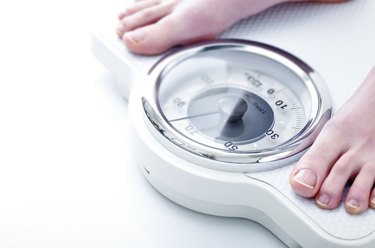
At the age of 20, you're at a pivotal time in your life as you transition into full-fledged adulthood. Although your mind might be occupied with school, entering the workforce or even starting a family, your health should never take a back seat. If life's pressures during your late teens led to some weight gain, make the necessary changes at the age of 20 to lose the weight and build a healthy lifestyle moving forward.
Get Moving
Video of the Day

You can't discount the importance of regular exercise if you're intent on losing weight. Not only will exercise contribute significantly to your physical and emotional health, it plays a role in weight loss, notes the Cleveland Clinic. Despite your schedule, make time for a minimum of 2.5 hours of cardio and two strength-training workouts every week. Together, these two elements provide a well-rounded exercise routine that can lead to weight loss and better health over time. To increase your motivation, pick exercises you enjoy, for example, jogging with a friend and taking a yoga class.
Video of the Day
Improve Your Diet

If you're still in school at the age of 20, weekend keg parties or dinner out with friends might be part of your weekly routine. If you've entered the work world, coffee and a muffin might be staples of your morning commute. Whatever the case, this diet will only contribute to weight gain, rather than weight loss. Don't struggle with choosing a fad diet; improve your diet through subtle yet healthful changes, such as cutting back on the amount of high-fat, high-calorie foods you consume. For example, drink water instead of alcohol or soda and have some whole-grain toast and a yogurt for your workday breakfasts, suggests the American Council on Exercise.
Catch More Shut-Eye

Late nights or early mornings might be part of life when you're 20, but don't discount the importance of sleep. "The New York Times" notes a shortage of sleep can cause you to eat more, which leads to weight gain. Additionally, if you're constantly tired, you'll likely lack the energy or motivation to exercise daily. If possible, aim to get about eight hours of sleep per night. Skip the late-night reruns in favor of an extra hour of sleep and your body will thank you for it.
Make Health-Conscious Friends

It's easy to get pulled into an unhealthy lifestyle when your peers aren't exactly concerned about their health, but if weight loss is your goal, make friends who are seeking to lose weight or develop a healthier body. Working out with a partner has many benefits, including shared motivation. Look for someone in your dorm, at school or at work.
- Cleveland Clinic: Aerobic Exercise
- Centers for Disease Control and Prevention: How Much Physical Activity Do Adults Need?
- American Council on Exercise: Trimming Off the Fat
- American Council on Exercise: Weight Loss: Diet vs. Exercise
- The New York Times: How Sleep Loss Adds to Weight Gain
- My Sports Clubs: The Benefits of Having a Workout Partner